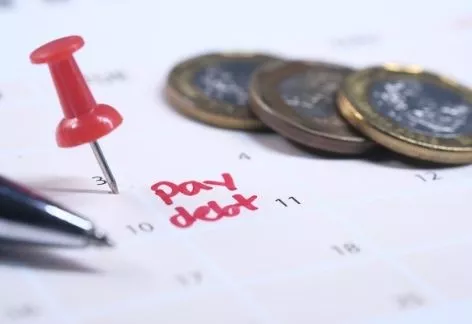If you are experiencing tax debt and owe money to the IRS, you have the option of creating a payment plan, also called an installment agreement; but can you have 2 installment agreements with the IRS?
Can you have 2 installment agreements with the IRS? Not exactly. When you owe taxes, the IRS allows you to reduce your penalties and interest rate while paying down your balance over time via an installment agreement. As long as you adhere to the terms of the agreement, you can avoid further collection actions and work your way through your debt at a reasonable pace.
If you’ve realized that, due to financial constraints, you’re unable to pay your taxes for a subsequent year, you can choose to fold your debt into your existing installment agreement.
To reiterate – you cannot have two installment agreements with the IRS. However, you can pay off more than one tax debt through your existing installment payment.
When you owe the government money, the IRS marks a deficit on your tax account. Further debt accrued simply increases that balance due. Your installment payment can be altered to reflect a change in your balance. You can request this change by contacting the IRS directly, through your local IRS office, with the help of a professional IRS tax attorney or by calling 1-800-829-7650. Alternatively, you can fill out Form 9465 with the requested relevant information.
What Is An IRS Installment Agreement?
An IRS Installment Agreement is a payment plan that you set up with the U.S. Internal Revenue Service (IRS) to pay your federal tax debt over time. It’s designed for taxpayers who cannot pay their entire tax debt in a single lump sum.
There are different types of installment agreements, including:
Guaranteed Installment Agreement
This applies if you owe less than $10,000, excluding penalties and interest, have not had an installment agreement in the past five years, and can pay the full amount within three years.
Streamlined Installment Agreement
This applies if you owe $50,000 or less, and can pay the full amount within 72 months (six years).
Partial Payment Installment Agreement (PPIA)
This allows you to make monthly payments towards your debt that are based on what you can actually afford after accounting for your essential living expenses.
Non-Streamlined Installment Agreement
This applies if you owe over $50,000 and/or cannot meet the payment terms of the other types of agreements.
How Do IRS Installment Agreements Work?
Tax debt is a severe problem. The IRS takes its duty to collect taxes very seriously – and has the means to take priority over other creditors when it seeks to collect what is due.
As a taxpayer, you have an obligation to pay your taxes on time. Failure to do so can result in financial penalties and accruing interest. Intentionally avoiding tax payments can even be a crime.
As your tax debt grows, the IRS will continue to take increasingly drastic measures to try and collect what is owed.
While you cannot have 2 installment agreements with the IRS, a payment plan allows you to avoid further collection actions and work on paying off your debt. There are two ways to enter into an installment agreement with the IRS:
1. Short-term payment plan:
Any payment plan that stipulates total payment within 180 days, usually in the form of one or more lump sums.
2. Long-term payment plan:
A monthly installment payment plan of any length longer than 180 days (up until the debt is paid or hits its statute of limitations).
An installment agreement can be set up entirely online or via mail or phone. You can also set up an installment agreement in person. Under most circumstances, it is cheapest to set up an installment agreement electronically. Currently, however, short-term payment plans can only be set up via mail or phone.
There are limits to how hefty a taxpayer’s debt can be for certain payment plans. For example, taxpayers with a total tax debt exceeding $50,000 do not have the option of paying their debt through a monthly payment plan. It is also worth noting that tax balances over $25,000 must be paid via Direct Debit.
Note that there are a few stringent requirements for entering into a payment plan, and there are several things you should note if you wish to avoid defaulting.
Installment Agreement Requirements
One of the most important requirements is that you are completely up to date with your tax returns.
Even if you can’t pay your taxes, the IRS will not accept an installment agreement unless you’re caught up with all of your returns, so it is imperative that you do not have any unfiled tax returns. The IRS will check at least the last three years, and generally up to six years, to determine if you’ve been keeping up with your returns and are eligible for an installment agreement.
Being late or accruing an additional tax debt without requesting that it be added to your previous tax balance can lead to a default. Setup fees can be waived if you qualify as a low-income taxpayer. Other tips include:
-
Pay your minimum monthly payments when they’re due.
-
File your subsequent returns on time for the duration of the installment plan.
-
Note that all your future tax refunds will automatically go towards paying off your debt until the debt is paid (stimulus checks or Economic Impact Payments are not a tax refunds, even though they are sent out via the Treasury and IRS).
How To Apply For An Installment Agreement
To apply for an IRS installment agreement, you have a few options depending on your situation.
- Online Application: The fastest and most convenient way to apply for a short- or long-term payment plan is online. To do this, log in to the Online installment agreement IRS Form on the IRS website. This method is only applicable if you’ve filed all of your tax returns, you owe $50,000 or less, and you can pay off what you owe.
- IRS Form 9465: If you prefer not to use the online tool, you can fill out IRS Form 9465, the Installment Agreement Request form. After completing the form, mail it to the IRS for review.
- Phone Application: You can also apply for an installment agreement over the phone.
Before applying, ensure you’re eligible to set up a payment plan. For instance, you must have filed all required tax returns. Also, bear in mind that there might be limitations on having multiple installment agreements with the IRS.
What if I Don’t Pay?
A default in a payment plan means the IRS will continue to levy collection actions against you. These range from a federal tax lien (a public notice letting the government take priority over all current and future creditors, making it harder to seek financing or loans) to a levy on your assets or wages.
What if I Can’t Pay?
If you cannot afford to pay off the entire debt over the course of its lifetime (ten years from the date of assessment on your initial notice, plus tolling periods), the IRS may consider an Offer in Compromise.
Considering an Offer in Compromise
An Offer in Compromise is a payment plan specifically built to allow you to avoid financial hardship while dedicating nearly all non-essential assets and income to your debt. The IRS takes assessing these offers very seriously and will not accept an offer that they consider to be too low based on the information you provide them.
If you do consider an Offer in Compromise, it is in your best interest to speak to a tax professional. The IRS will not levy collection actions against you while evaluating your offer, but your debt will continue to accrue penalties and interest. Put your best foot forward by working with an experienced professional to set up an offer.
How To Make Changes To an IRS Payment Plan
If you need to make changes to an IRS payment plan, you can follow these steps:
- Understand Your Options: The IRS provides several options for making changes to a payment plan. You can revise your monthly payment amount, change your monthly payment due date, or convert an existing agreement to a Direct Debit agreement.
- Online Payment Agreement (OPA) System: If you have an existing installment agreement, you can use the OPA system on the IRS website to make changes.
- Visit the IRS website and log into your account.
- Select “View or Change Your Existing Agreement”.
- Follow the prompts to update your agreement.
- Form 9465 Installment Agreement Request: If you cannot use the OPA system, you can complete Form 9465 and mail it to the IRS. This form allows you to propose your own terms for a new installment agreement.
- IRS Customer Service: You can also call the IRS customer service line for help with modifying your payment plan.
Remember, it’s essential to keep making your current payments until your request is approved to avoid penalties.
The IRS does not leave much room for interpretation when it comes to tax debts – you will have to somehow pay off your balance, sooner or later, and always to the best of your abilities.
An experienced tax professional can navigate the IRS’s rules, statutes, and payment options to help you find the best way to eliminate your tax debt. Take the guesswork out of paying off your debt by speaking with a tax professional today.

